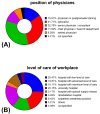Teaching Practical Skills in Anesthesia, Intensive Care, Emergency and Pain Medicine-What Is Really Relevant for Medical Students? Results of a German National Survey of Nearly 3000 Anesthesiologists
- PMID: 36421584
- PMCID: PMC9690720
- DOI: 10.3390/healthcare10112260
Teaching Practical Skills in Anesthesia, Intensive Care, Emergency and Pain Medicine-What Is Really Relevant for Medical Students? Results of a German National Survey of Nearly 3000 Anesthesiologists
Abstract
As a part of a major reform of the medical curriculum in Germany, the national catalogue of learning objectives is being revised with the focus shifting from theory-based learning to teaching practical skills. Therefore, we conducted an online survey to answer the question, which practical skills are essential in anesthesia. Participants were asked to rate the relevance of several skills, that medical students should be able to perform at the time of graduation. A total of 2898 questionnaires could be evaluated. The highest ratings were made for "bringing a patient into lateral recumbent position" and "diagnosing a cardiac arrest". All learning objectives regarding regional anesthesia were rated as irrelevant. Furthermore, learning objectives like "performing a bronchoscopy" or "performing a rapid sequence induction" had low ratings. In the subgroup analysis, physicians with advanced training and those who were working at university hospitals rated most skills with higher relevance compared to others. Our survey provides a good prioritization of practical skills for the development of new curricula and assessment frameworks. The results can also help to establish our discipline as a cross-sectional subject in competency-based medical education, thus further increasing the attractiveness for medical students.
Keywords: anesthesiology and intensive care; assessment & education; curriculum development; learning objectives; medical education; medical studies; online survey; practical Skills.
Conflict of interest statement
The authors declare no conflict of interest.
Figures



References
LinkOut - more resources
Full Text Sources
Research Materials

